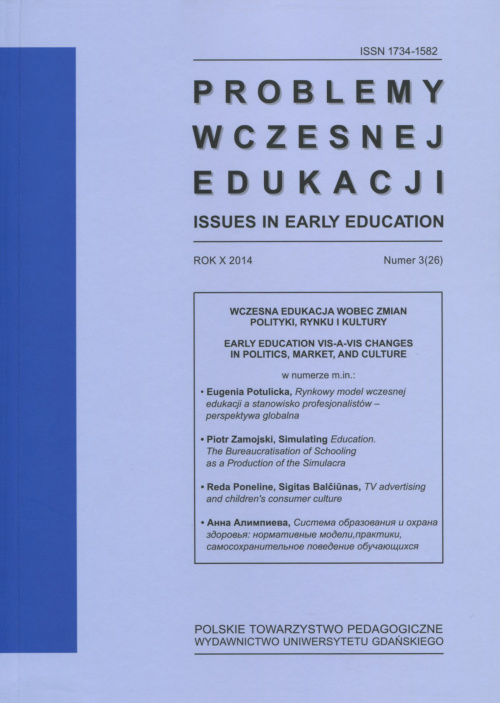Rynkowy model wczesnej edukacji a stanowisko profesjonalistów – perspektywa globalna
Słowa kluczowe:
wczesna edukacja, rynkowy i demokratyczny model wczesnej edukacji, polityka edukacyjna, partnerstwo publiczno-prywatneAbstrakt
The text presents an analysis of global sources of the increasing expansion of the market model in the field of early childhood education, understood as all institutional types of pre-schooling education. The importance of this stage of education for the child’s development – especially in disadvantaged groups – and its subsequent functioning at school does not seem to be questionable in the light of the research results cited. Nonetheless, the possibility of every child’s access to good, public, and free early education is far from satisfactory. Consideration of this issue from the economic, educational, and political perspectives reveals a number of tensions and problems, conditioned locally and globally. One of the key issues is the opposition between the market model of early childhood education and aspirations to implement democratic solutions supporting these wide learning objectives for children. However, the economic crisis makes education in the field of early childhood education require public and private partnership, implemented in the context of specific government regulations.
Downloads
Bibliografia
Barlett S. (2010), Improving learning achievements in early primary and low-income countries. AgaKhan Foundation.
Bartnett W.S. (2008), Preschool education and its longlasting effects. Boulder, Education and PublicInterest Center.
Bentley T. (2005), Everyday democracy. London, Demos.
Bird K. (2013), 3 ongoing trends in early childhood education and how they impact you, http://www. rasmusen.edu/degrees/education/blog/3-ongoing-trends.
Cagliari P., Barozzi A., Giudici C. (2004), Thoughts, theories and experiences for an educationproject with participation. „Children in Europe”, Vol. 6.
Carr W., Hartnett A. (1996), Education and the struggle for democracy. Buckingham, Open University.
Cleveland J. at al. (2007), An economic perspective on the current and future role of nonprofitprovision of early learning and child care services in Canada. http://www.childcarepolicy. net/research/documents/final-report-FINAL-print.pdf., 01.10.2014.
Davies B., Saltmarsh S. (2007), Gender economies. „Gender and Education”, Vol. 17, No. 1.
Early childhood education: A global scenario (2010). Brussels. Education International.
Early childhood education and care (2011). Brussels, European Commission.
Education at glance (2012), Paris 2012, OECD.
Education for All (2007). Washington D.C., UN Secretary General Report and Resolution on ImplementingRights in Early Childhood.
Education today. The OECD perspective (2008). Paris, OECD.
EFA global monitoring report (2011), Paris, UNESCO.
Fairnholm R. (2009), Literature review of socioeconomic effects and benefits of ECEC labour market. Ottawa, Child Care Human Resources Sector Council.
Global education digest 2010 (2010). Paris, UNESCO-UIS.
Jalongo M.R. at al. (2004), Blended perspectives: A global vision for high-quality early childhoodeducation. „Early Childhood Education Journal”, Vol. 32, No. 3.
Little steps. Learning for the very young (2013). „The Economist”, February 9ts.
Mańkowska A. (2012), System edukacji w Norwegii. W: E. Potulicka, D. Hildebrandt-Wypych,C. Czech-Włodarczyk (red.), Systemy edukacji w krajach europejskich. Kraków, OficynaWydawnicza Impuls.
Marengos A., Plantegna J.(2006), Introducing market forces. „Children in Europe”, Vol. 11.
McCuaig M., Bertrand J., Shanker S. (2012), Trends in early childhood education and care. Toronto,Atkinson Centre for Society and Child Development.
Moss P. (2008), Market and democratic experimentalism. Two models for early education and care. London, Institute of Education, University of London.
Naedeau S. at al. (2011), Investing in our children, Washington D.C., World Bank.
Neugebauer R., Goodeve E. (2009), Global trends in early childhood education. „Exchange”, May/June.
Osgood J. (2004), Time to get down to business? „Journal of Early Childhood Research”, Vol. 2,No. 1.
Policy in France (2004). Paris, OECD.
Policy review report: Early childhood care and education in Brazil (2007), Paris. UNESCO.
Potulicka E. (2012), System edukacji w Wielkiej Brytanii. W: E. Potulicka, D. Hildebrandt-Wypych,C. Czech-Włodarczyk (red.), Systemy edukacji w krajach europejskich. Kraków, OficynaWydawnicza Impuls.
Right beginnings: Early childhood education and educators (2012). Geneva, International LabourOffice.
Starting strong: Early childhood education and care (2006). Paris, OECD.
Sylva K. at al. (2004), The effective provision of preschool education. http://www.ioe.ac.uk/ schools/findings%20from20Preschool.pdf, 01.10.2014.
Summary of progress towards education for all (2011). Paris, UNESCO.
Too small to fail. Preparing America’s children for success in the 21st century (2013). WashingtonD.C., Clinton Foundation/Next Generation.
Treasury H.M. (2004), Choice for parents, the best start for children. London, The Stationary Office.
The future of the left. James Crabtree interviews Roberto Unger (2005). „Reneval”, Vol. 13, No. 2/3.
The hidden crisis. Armed conflict and education (2011). Paris, UNESCO.
The child care in transition (2008). Florence, UNICEF.
The importance of early childhood development to education (2013). Dakar, The Consultancy Groupon Early Childhood Care and Development.
The state of early childhood education in Canada 2012 (2013). Toronto, Child Care Resource andResearch Unit.
UNESCO Data Centre (2011), http://stats.uis.unesco.org/unesco/ReportFolders/Report Folders.uspx, 01.10.2014.
Vargas-Baron E., Schipper J. (2012), Review of policy and planning indicators in early childhood. Paris, UNESCO.

 Uniwersyteckie Czasopisma Naukowe
Uniwersyteckie Czasopisma Naukowe





